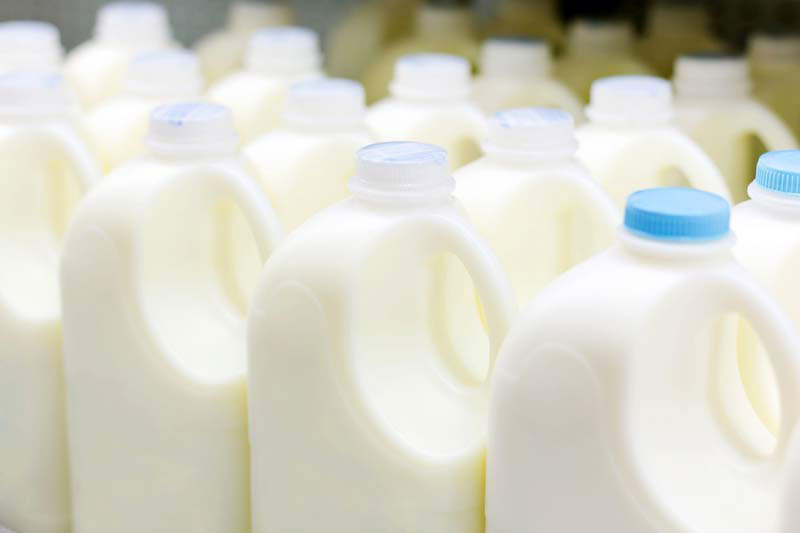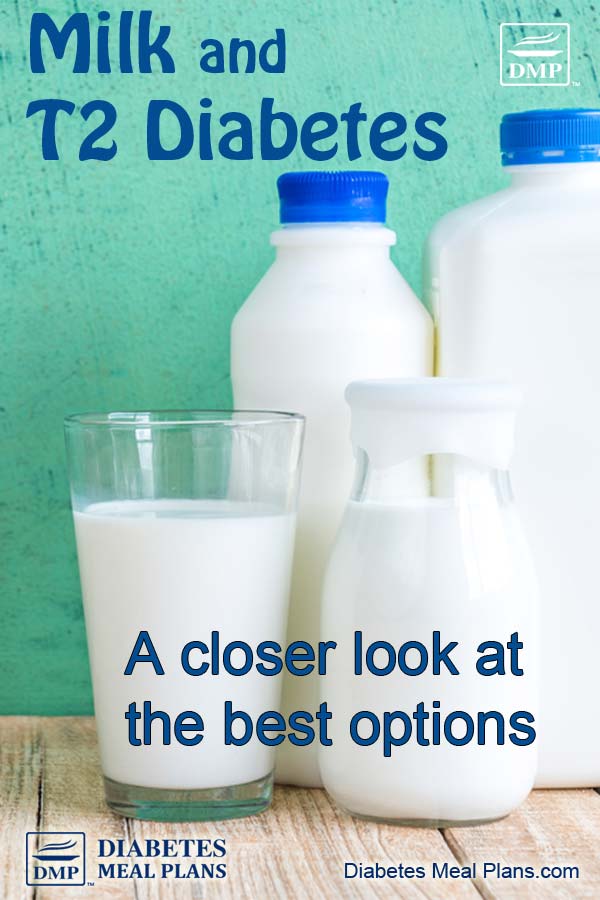Table of Contents[Hide][Show]
Like all individual foods in our diet, there’s often debate about whether they are good or bad for our health – and milk doesn’t escape this analysis.
When it comes to milk and diabetes, you have full fat, skim milk and low fat options for dairy milk. Then you have soy milk, rice milk, almond milk and coconut milk for non-dairy options. So overall, what is the best option?
Let’s explore this topic in more detail, starting with dairy milk…

Dairy Milk
On the one hand, dairy products have long been promoted as healthy inclusions in our diet – they contain calcium (for strong bones), along with magnesium, vitamin D, and whey proteins.
Milk proteins in particular are considered high quality proteins, which according to research may help in reducing body fat and insulin resistance, along with showing benefits for glucose regulation and metabolic health.
On the other hand though, milk also contains fat and carbs. For many the major concern is the fat content, which is why it’s often assumed that skim milk or low fat options are best. Before delving into this further, let’s just compare the nutrition facts for dairy milks.
|
Per half cup |
Full cream milk |
Low fat |
Fat free |
|
Calories |
76 |
51 |
39.5 |
|
Total carbs |
6 |
6 |
6 |
|
Protein |
4 |
4 |
4 |
|
Fat |
4.05 |
1.18 |
0 |
Notice something about these? They all have the same carb and protein content, the only difference is the calories and fat content.
Because they are so similar, you can really choose any of the options. Don’t be scared of full fat as studies suggest there is no association between intake of full fat dairy and type 2 diabetes – which basically means they are not necessarily good or bad.
As for cardiovascular disease, research indicates that dairy consumption (full fat or not) may have a beneficial effect, reducing the risk of stroke and diabetes. And in regard to dairy’s contribution to blood cholesterol, the only dairy product showing any kind of slight implication was butter – even then associations have been small.
So the message here is, feel free to drink milk – and full fat milk, too. Just be aware however that dairy milk does contain lactose, which is a form of sugar, half cup is 6 grams of carbs so it’s not a great idea to go drink a huge dairy milk smoothie or milkshake!
And one other cautionary word: Dairy can be inflammatory in some people.
Dr Mark Hyman, diabesity expert, suggests that dairy is one of the two most common inflammatory foods. You may not have a major allergic reaction to dairy, but on a cellular level your body may be reacting.
If you want to lose weight and find that your scales don’t budge, or you have any nasal congestion, bloating, indigestion, rashes, muscle aches, or mood swings, don’t discount dairy as a possible culprit. Cut it out for a while and see if you get better results.
Soy Milk
There have only been a few studies on soy milk and type 2 diabetes, overall, they don’t really show any benefits either way, other than for probiotic soy milk, which may have a slight blood pressure-lowering effect.
And of course, non-dairy sources will not contain as much calcium as dairy. This is not necessarily a problem as you get calcium from various other food sources.
Nutrition facts for half cup unsweetened soy milk:
- Calories 70
- Carbs 4
- Protein 7
- Fat 4
Being that we encourage a low carb diet (because it works best), unsweetened soy milk is a perfectly acceptable milk option as it contains similar nutrition value to cows milk.
Rice milk
There are no available studies on rice milk for type 2 diabetes. But again, this is a higher carb milk so isn’t one we’d recommend in a low carb diabetic diet.
Unsweetened rice milk, half cup:
- Calories 56
- Carbs 11
- Protein 0.3
- Fat 1

Almond milk
When it comes to the lowest carb options, almond milk does win the race. For smoothies and milkshakes, almond milk makes a great low carb selection, though it’s not as creamy as other milks.
Blue Diamond Almond Breeze, unsweetened, half cup:
- Calories 15
- Carbs 0.5
- Protein 0.5
- Fat 1.25
Overall everything is lower, but with that said you do get a reasonable amount of calcium, potassium, sodium, and vitamin A.
Coconut milk
Coconut milk is higher in saturated fat – mostly medium chain – it’s the long chain fatty acids that have the major link with health issues.
Coconut milk, canned, half cup:
- Calories 222
- Carbs 3.2
- Protein 2.25
- Fat 24
Coconut milk is also higher in calories so although great to use in sauces such as curries, if you’re trying to lose weight and keep calories a bit lower, don’t go overboard on this one.
Milk and diabetes top picks?
Lowest carb: Unsweetened almond milk
Best coffee creamers: Dairy milk, unsweetened soy milk, unsweetened almond milk, unsweetened coconut milk or a dash of cream.
Best avoided: Sweetened soy milk and rice milk – much higher in carb content.
What type of milk do you drink?
Please pin, tweet or share this info to help others. Thanks!
References
Brouwer-Brolsma EM, et al. Intake of different types of dairy and its prospective association with risk of type 2 diabetes: The Rotterdam Study. Nutrition, metabolism, and cardiovascular diseases: NMCD. 2016;26(11):987-95.
Hariri M, et al. The effect of probiotic soy milk and soy milk on anthropometric measures and blood pressure in patients with type II diabetes mellitus: A randomized double-blind clinical trial. ARYA atherosclerosis. 2015;11(Suppl 1):74-80.
Miraghajani MS, et al. Soy milk consumption, inflammation, coagulation, and oxidative stress among type 2 diabetic patients with nephropathy. Diabetes care. 2012;35(10):1981-5.
Singhal S, et al. A Comparison of the Nutritional Value of Cow’s Milk and Non-dairy Beverages. Journal of Pediatric Gastroenterology and Nutrition. 2016.
Hariri M, et al. A randomized, double-blind, placebo-controlled, clinical trial on probiotic soy milk and soy milk: effects on epigenetics and oxidative stress in patients with type II diabetes. Genes & Nutrition. 2015;10(6):52.
Astrup A, et al. Regular-Fat Dairy and Human Health: A Synopsis of Symposia Presented in Europe and North America (2014–2015). Nutrients. 2016;8(8):463.
Bjørnshave A, Hermansen K. Effects of Dairy Protein and Fat on the Metabolic Syndrome and Type 2 Diabetes. The Review of Diabetic Studies: RDS. 2014;11(2):153-166.

David Malt
Dairy milk any day of the week.
M.
Here’s a thought for other another reason to be careful with dairy. It can imbalance your hormones. I had a hormone specialist tell me this quite adamantly, esp. for weight loss. Yes, regular dairy, not only soy…although soy might be worse.
However, all of us Love to make exceptions and I’d rather have cheese than other sweets at holidays. I’ve always been sensitive to both the lactose ( milk sugar ) and casein ( protein ).
TIP for anyone sensitive to dairy : you may be highly vitamin D 3 deficient. I was, and after supplementing for about a year was able to eat unsweetened whipped cream for the first time without discomfort! You may see that milk has vit. D added, but it’s D2, which is not easily absorbed. Also if you are quite deficient, a normal dose might not even touch your symptoms. So the good news is: If you are really dairy sensitive, get your D checked, and you might be cured!
Malorie: Dietitian (MS, RD, CLT)
Thank you for sharing your thoughts on dairy. Yes, for some individuals dairy can be inflammatory which can impact hormones balance if that inflammation persists over time. It is always a good idea to check your Vitamin D status, especially since low vit D is common in diabetes, and having a low Vitamin D level can impact many aspects of our health!
Marlene Hivert
For the most part I use organic 2% milk but the only place I use milk is in tea. On the odd occasion, I have oatmeal porridge for breakfast and I pour some coffee cream on that. Actually, dairy is one of my faves but, thankfully, it is not a very big part of my diet now. For coffee I use coffee cream but usually only have 1 cup a day. I have tried soy, almond and rice milk. So happy to hear that we can stick with the cow’s milk. I have to enjoy my meals or I fall off the wagon!
Kim
Jedha;
Hi,I buy fairlife 2% milk that is lactose free,unsweetened coconut milk,unsweetened almond milk which are lactose free,I also buy,natrel 2% milk and natrel vanilla ice cream that are also lactose free.I eat salads,homemade soups,grilled chicken,cod or halabut fish that is not breaded,low fat low sugar or plain yogurt that I mix with fresh fruit,converted uncle bens rice or brown rice,fresh veggies or steamed frozen veggies,etc.
I just recently switched over to whole wheat pita pocket bread( small ones) and small thin sliced 100% whole wheat bread.I try really hard to keep my blood sugar under control which is a challenge but i keep at it on a daily basis as well as journaling my blood sugar and insulin in a book.
I eat three meals a day plus healthy snacks and smoothies and i don’t feel hungry at all,i go on daily walks weather permitting,i go swimming as often as i can but only with a guide friend because i am partually sighted with limited vision and i use a white cane.
I have had to stay in my apartment for a little while due to the wildfire smoke here in alberta because it is affecting my asthma.
Kim
jean v.munoz
where to buy almond milk for diabetic and how much
Jedha
You can purchase almond milk from most grocery stores these days Jean, it is pretty common. Otherwise you can order online. The cost is just a few dollars. Make sure you choose an unsweetened variety, unless it uses something like stevia or natural vanilla for sweetener.